"An individual has not started living until he can rise above the narrow confines of his individualistic concerns to the broader concerns of all humanity"
Martin Luther King, Jr.
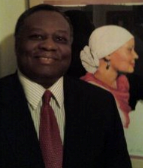 |
| Dr. Tedd Collins IV (Dr. Collins) |
Dr. Tedd Collins IV is a man on a mission. A mission born out of the devastating loss of his lovely daughter Natasha last August to complications of a bone marrow transplant that was not her genetic match. According to Tedd, "Natasha was attending medical school at Yale when she passed and would most likely be alive today if my wife and I had been offered an opportunity to bank her cord blood when she was born. But, as is often the case, families who are most vulnerable don't learn what they need to know until it's too late."
Even though Tedd Collins spent most of his life being trained as a cancer researcher in the field of leukemia and lymphoma, he was taken by surprise by the large gap in knowledge of how to treat a mixed race patient needing a cord blood or bone marrow transplant. Tedd discovered that because Natasha was of mixed heritage - the daughter of an African American father and an Irish American mother - it was impossible to find a perfectly matched donor in the National Marrow Donor Program registry. He said, "a high percentage of minorities and a lower, but still troublesome, percentage of whites also face this harsh reality." Tedd told me they originally started Natasha's Place (Natashasplace.org) to find a bone marrow match for Natasha. With the help of many of her classmates at Yale, they registered 10,000 people, but could not find a match. In the general bone marrow transplant pool of 12 million people... NO ONE MATCHED. He said, "After she passed we refocused on finding matches for those in imminent danger of dying because they don't have a safe bone marrow donor." Tedd and his wife Anne started BecomeMyHero.org with this mission: " We are here to insure that mixed heritage families and individuals receive equal access to the life saving potential of effectively safe stem cell transplants, not because it's good business but because it's our moral imperative. Our non-profit support group even provides grants to make private cord blood banking more affordable to families needing financial assistance."
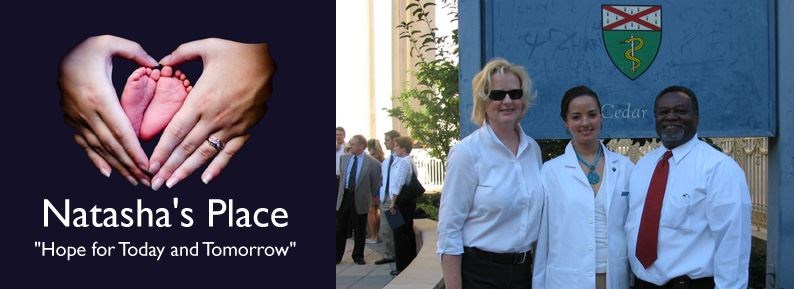 |
| Anne, Natasha and Tedd (Tedd Collins) |
So what is Cord Blood? According to information listed at Natashasplace.org, Cord Blood is what remains in the umbilical cord after a baby is born and the umbilical cord is cut. The cord blood contains stem cells. Stem cells are the cells that make all of the other cells in your body, i.e., heart cells, neural cells, etc. This blood is a rich source of the same stem cells found in bone marrow. These stem cells are brand new so they don't have the ability to recognize that they are not in the same body, so won't reject or fight against itself. So partially matched cord blood stem cells from an unrelated donor offer the advantage of usually not causing the life-threatening "graft versus host" responses that frequently occur when partially matched unrelated, bone marrow stem cells are used for a transplant. This means your chance of surviving a transplant and therefore your disease is much much greater. Cord blood stem cells are now being used to treat more than 80 medical conditions and diseases, including leukemia, sickle cell anemia, multiple sclerosis and lupus. The first successful cord blood transplant was performed in France in 1988, for a child with Fanconi's Anemia. Then in 1991, a transplant was "successfully performed on a child with chronic myelogenous leukemia, opening doors to use cord blood for situations where traditional bone marrow was routinely utilized."
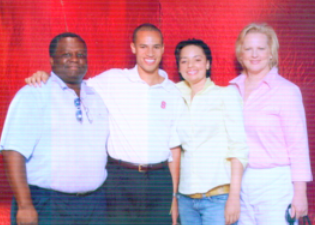 |
| Tedd, Teddy, Natasha and Anne Collins (Tedd Collins) |
Tedd explained, "We work with people who are at the point they are no longer in remission and they will die in 5 months or less if they don't find a donor. We really after finding Cord Blood donors. The reason it is difficult to find a match is because there are so few people LIKE them, because of their genetic heritage." With cord blood transplants, only a partial match is needed and can still be very effective, plus you won't have a lifetime of taking drugs to ward off Graft Versus Host disease. When Natasha first got leukemia she received a cord blood stem cell transplant in Kentucky, that gave few complications and had her walking out of the hospital a week later. She then followed her dream of going to Yale Medical School, but in her second semester she relapsed and had to finish her first year of med school taking chemo treatments while everyone at Yale searched for a donor. At the time Yale did not perform cord blood transplants but found a partial bone marrow match for Natasha. A month after this transplant, Natasha died of "graft versus host disease."
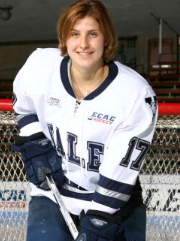 |
| Mandi Schwartz (BecomeMyHero.org Photo David Silverman) |
Natasha Collins was by all accounts an amazing human being. She was an accomplished athlete and violinist, beautiful - inside and out, a great daughter and sister, funny, smart, loving and always thinking of others. When she was so ill, she told her Dad, "I understand that I may never benefit from this but others might." Tedd pauses and says, "Without this, I don't know where I'd be. We were empty nesters but once Natasha came back home after her transplant, my wife and daughter became so close. Anne kept everyone away, if they were slightly sick, so they wouldn't compromise Natasha's immune system." On a recent online posting on Facebook, Tedd said, "I still don't believe we can live without her...exist maybe...live never." Speaking of social media, Tedd told me how much it is helping to find very "hard to find" donor matches. "One of the things I realize is that my job is to stay small and focused. Advocate and yell from hilltops and build a network of people that care about these people. Currently, his foundation is searching for a blood cord match for a young hockey star from Canada, Mandi Schwartz. They use Facebook and Twitter to create a virtual community of people who support and advocate for Mandi, while spreading the word far and wide, to pregnant mothers to be, to doctors, hospitals and anywhere people can think of to find a match."
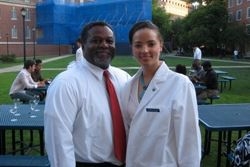 |
| Tedd and his daughter Natasha (Tedd Collins) |
What would you do or say if you had the world's attention for 5 minutes?
"There's a better way. That's it. And we are concentrating on the wrong thing. Someone said they would like me to use more lightning words like stem cell justice... People of mixed heritage, what the medical community is doing to them is, in my opinion, criminal. If there are 100 people coming through and you can save 50, they are happy with that. The other 50%? They lose mixed heritage every time because if you get a bone marrow match they die (as it can only ever be a partial match) and if they don't get a match, they die."
Who is your hero and why?
"Mmmm. Well actually, really, my daughter Natasha. She was such an incredible person. Here you had a kid that... I saw her become an adult and she really had no ego, even at Yale. She was always a person that could bring everyone together and make everyone better than they were. She was one in a million, even at Yale. Natasha was pure, forgiving and love. I hope to grow up to be just like her. I wouldn't have said that 10 years ago, I didn't know her as well."
Page created on 4/2/2013 12:00:00 AM
Last edited 12/12/2016 7:42:19 PM
